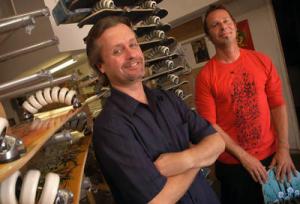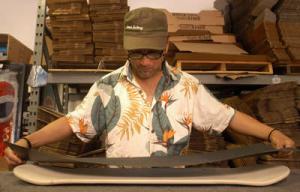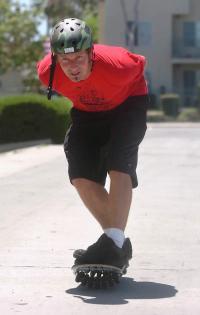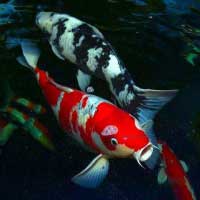
LONG BEACH - The moment Michael Kern came across the 14-wheeled skateboard known as "the flowboard," the Long Beach entrepreneur had to have it.
"A guy came around with this flowboard he bought off the street and I thought, `Wow, this thing's really cool,"' Kern said of the skateboard that can carve 45-degree turns without resistance.
"You can wakeboard, snowboard and surf on concrete," he said. "You've always got that rush of the surf, even in Wichita, Kansas."
Kern was so floored that he called the guys who developed the product that day, flew to San Francisco the next day to meet them and bought all the licensing rights to the product.
That was in 2001. Seven years later, after maneuvering the company past some unusual obstacles, Kern's action sports business, Sport Technology Inc., is finally catching major air.
The company is expanding the flowboard business, breaking out of limited specialty pro-shops and into larger outlets. It is also growing its international market and has offices in China.
The company is also building its product line and expanding the number of businesses carrying their products at shopping center kiosks.
"Now that extreme is so mainstream, now everybody is looking for the next thing to enjoy gravity, enjoy those different rushes of being on wheels," Kern said.
He started working as a teenager, for his father, in the glass business.
After graduating from Cerritos High School, Kern studied business at Cypress College and began developing different products out of his garage.
In 1991, Kern began building his company - initially called Bomb Factory - by creating and selling hip-hop clothing and developing a special sunblock for tattoos and a henna-based body art kit.
The business, however, suffered a slight setback after the Sept. 11, 2001, terrorist attacks.
"When 9-11 happened, the feds would see the word `bomb' and would not

ship our stuff," he said.
He changed the name to Sport Technology, Inc.
The year also signified a change in the company's direction - that year, Kern discovered the flowboard.
Kern calls the discovery "lucky."
"We were at the right place at the right time," he said. "A kid walking out of Redondo Beach saw these two guys from San Francisco hanging out at this bar with this skateboard. He ended up buying this flowboard for $250. It was such a novelty that he brought it back to the warehouse to me."
He met with the developers, Pieter Schouten and Mike Simonian, design students who attended the Art Center College of Design in Vevey, Switzerland.
The pair in the '90s created the technology based on their love of snowboarding and surfing.
Unlike the standard skateboard, which allows only for 25-degree turns on its four wheels, the flowboard features the pair's patented Deep Carve System. The seven wheels curved at each end of the board allow riders to carve through 45-degree turns with fluidity.
The pair along with another business partner founded Flowlab and were sought by several brand name companies. By 2000, they were shipping out the first flowboards.
Kern, Flowlab's largest distributor, bought the company soon after and focused his resources on marketing and distributing the product.
"We're always looking for new ways to enjoy some gravity," said Scott Rickett, vice president of sales

and marketing for Sport Technology, Inc. "That's what we love. Gravity is so fun."
The company has 10 employees. It makes between 300 and 2,000 boards and other products a week, depending on the season, in its Long Beach pro shop, a warehouse on South Street. (The company also has a 30,000-square-foot warehouse in Pico Rivera for bulk shipments to larger stores.)
He brought them to specialty skate, surf and snow shops and national and regional sporting goods retailers such as Big 5 and Chick's Sporting Goods.
He purchased a 40-foot-long tour bus and traveled to skate parks, beach events and surf expos across the country to market the brand.
To help bring the flowboard to a broader audience, Kern signed a two-year deal in 2005 with Bravo Sports, a product marketing company.
"We thought it might have been a good way to penetrate the sporting goods side of the market while we focused on the pro channels," Kern said.
But it didn't happen. The company ended up shelving the product for two years for reasons unknown to Kern. Bravo Sports declined to comment.
To sustain the company during the two-year agreement, Kern and his team created a series of products, including the RAILZ Snowskate (a skateboard for the snow) and the Snowchuck (a toy that launches snowballs).
"It didn't stop us," Kern said. "It just slowed us down a couple of years for revenue purposes."
"The best thing is to go out there and don't be afraid," Rickett said. "You got to have a couple of flops before you have a hit. I don't care what kind of industry it is. You got to try and the cream will rise to the top."
Now with the pact finally expired, Sport Technology has relaunched the flowboard and resurrected the name Bomb Factory for the company's skateboard and T-shirt line.
"It's great," Kern said. "The market is finally out there for us. We've always been kind of ahead of our time and we're actually right on time now with a great product. The market acceptance is there for it. It's perfect timing."


